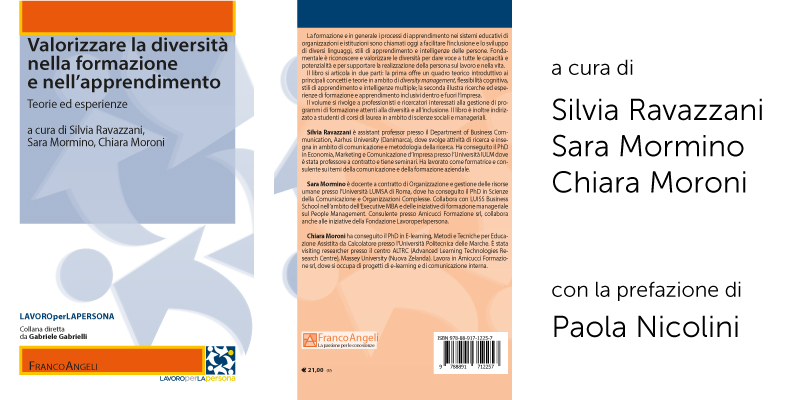Each individual has a different way of learning, a special way of problem solving, a different outlook on life, and a baggage of knowledge that is the result of previous experience, culture and age. Literature on the topic, the experiences and projects we are involved in suggest that to support personal realisation at work and in life it is necessary to give voice to the different capabilities and potential of each person, transforming diversity into a value and a source of enrichment. But how is it possible to facilitate the inclusion and development of people’s different languages, learning styles and intelligences? The book, edited by Silvia Ravazzani, Sara Mormino and Chiara Moroni, provides certain indications for recognising and celebrating the most intangible diversities in organisations and especially in training and in people’s learning processes. Good inclusive practices in the field of training The book is structured in two parts: the first offers a general theoretical introduction to the main concepts and theories in the area of diversity management, cognitive flexibility, learning styles and multiple intelligences the second illustrates research and experience of inclusive training and learning inside and outside the company. The volume, published as part of the ‘Lavoro per La Persona’ (Jobs for People) series, of the Lavoroperlapersona foundation, is intended for professionals and researchers interested in running training programmes that take account of diversity and inclusion. The book is also aimed at undergraduates studying social sciences and business management.  7 PhD Theses 7Studies on diversity and learning The papers of the volume are based on the 7 PhD Theses written in the last few years by the various partners of “Amicucci Formazione”:
7 PhD Theses 7Studies on diversity and learning The papers of the volume are based on the 7 PhD Theses written in the last few years by the various partners of “Amicucci Formazione”:
- Ravazzani S., (2011), “Diversity Management in Organizations: Where Companies Are in Italy and Where They Are Going”, PhD Thesis on Economics, Marketing and Business Communication, 23rd cycle, IULM University, Milan.
- Giordani P., (2011), “Promuovere la flessibilità cognitiva con le pillole formative multimediali. Studio di due casi”, PhD Thesis on E-learning & Knowledge management (23rd cycle), academic year 2010/2011, University of Macerata, Macerata.
- Di Renzo M.R., (2009), “L’efficacia della formazione ICT-based nello sviluppo delle competenze manageriali: evidenze da un caso aziendale”, PhD Thesis on Business Information Systems(20st cycle),academic year. 2006/2007, LUISS Guido Carli, Rome.
- Cipriani E., (2012), “Il testo prende forma. Il metodo per rappresentare la conoscenza”, PhD Thesis on E-learning & Knowledge Management, academic year 2011/2012, University of Macerata, Macerata.
- Fabiano S. (2012), “Il Flip-book. l’ebook progettato per la lavagna interattiva multimediale. Cosa, come e quanto è utilizzato”, PhD Thesis on E-learning & Knowledge Management, academic year 2011/2012, University of Macerata, Macerata.
- Mormino S. (2007), “Comunità professionali in rete: comunicazione policentrica, scambio di conoscenza, organizzazioni complesse”, PhD Thesis on Communication and Major Organisations Sciences(20th cycle), academic year 2006/2007, LUMSA (Libera Università Maria Santissima Assunta), Rome.
- Moroni C., (2007), “Discourse and negotiation in web forum: using the linguistic lens to observe discursive interactions in online learning environments”, PhD Thesis on E-learning Methods and Techniques for Calculator Assisted Education, academic year. 2006/2007, University of Marche Region, Ancona.
Chiara Moroni